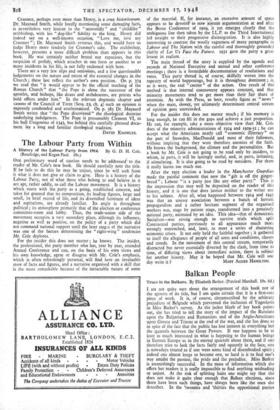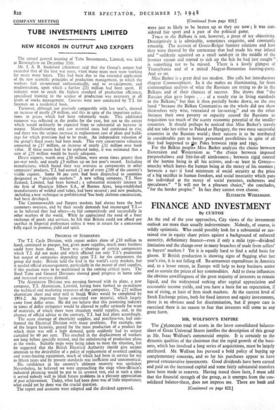Balkan People
Truce in the Balkans. By Elisabeth Barker. (Percival Marshall. 10s. 6d.)
I AM not quite sure about the arrangement of this book nor of the aptness of its title, but I am quite certain that it is a first-rate piece of work. It is, of course, circumscribed by the arbitrary prejudices of Belgrade which prevented the inclusion of Yugoslavia in Miss Barker's survey. As the jacket blurb of' her book points out, she has tried to tell the story of the impact of the Russiani upon the Bulgarians and Rumanians and of the Anglo-Americans upon Greece and Trieste at the end of the war, and she has done so in spite of the fact that the public has lost interest in everything but the quarrels between the Great Powers. If one happens to be at least as much interested in what is happeing to the human beings in Eastern Europe as in the eternal quarrels about them, and if one therefore tries to look the facts fairly arid squarely in the face, one is nowadays treated as if one were some kind of disembodied spirit ; indeed one almost longs to become one so hard is it to find one's way amidst the passion, the pride and the prejudice, Miss Barker is astonishingly successful. In the mass of information which she offers her readers it is really impossible to find anything misleading or unjust. At the risk of splitting hairs one might say that she does not make it quite clear enough that Balkan elections, since there have been such things, have always been like the ones she describes. In the 'twenties and 'thirties the oppositional Parties [Continued from page 8181
were just as likely to be beaten up as they are now ; it was con- sidered fair sport and a part of the political game. Truce in the Balkans is not, however, a piece of icy objectivity. Descriptively it is admirable, sometimes exquisite, and constantly amusing. The account of Greco-Bulgar frontier relations and how they were thawed by the cormorant that had made his way inland and "suddenly squatted on a small sand-pit in the middle of the frontier stream and started to sick up the fish he had just caught".. is something not to be missed. There is a lovely glimpse of Transylvania and of a mixed Magyar-Rumanian hunting-party. And so on.
Miss Barker is a great deal too modest. She calls her introductory chapter Commonplaces. In it she makes an illuminating, far from commonplace analysis of what the Russians are trying to do in the Balkans and of their chances of success. She shows that "the Russian plan gave hopes . . . of a steady rise in living standards in the Balkans," but that it then partially broke down, on the one hand "because the Balkan Communists on the whole did not show themselves very wise, restrained or far-seeing," and on the other because their own poverty or rapacity caused the Russians to requisition too much of the scanty economic potential of the smaller countries. It should perhaps be noticed that Miss Barker's travels did not take her either to Poland or Hungary, the two most successful countries in the Russian world ; their success is to be attributed in considerable part to better personnel possibilities in spite of all that had happened to itte Poles between 1939 and 1945.
For the Balkan peoples Miss Barker analyses the choice between Easternism and Westernism as "the choice between imposed purposefulness and free-for-all aimlessness ; between rigid control of the human being in all his actions, and—at least in Greece— anarchy which leaves the human being at the mercy of his enemies-; between a sure if hard minimum of social security at the price of a big sacrifice in human freedom, and social insecurity which puts the individual at the mercy of social parasites, racketeers and speculators." "It will not be a pleasant choice," she concludes, "for the border peoples." In fact they cannot even choose.
ELIZABETH WISKEMANN.



































 Previous page
Previous page